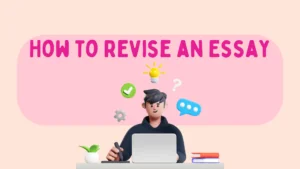Writing a common app essay is usually hard because many view it as a piece of text where one needs to put their entire life into 650 words. No wonder this task leaves many students feeling overwhelmed – it’s almost impossible to do. The pressure to impress admissions officers, tell a personal story, and highlight your unique qualities also makes the essay one of the most challenging parts of the application process. But don’t worry! With the right approach, this task can turn from a mountain into a molehill. In this guide, we’ll walk you through everything you need to know to craft a standout common app essay, step by step.

✅ AI Essay Writer ✅ AI Detector ✅ Plagchecker ✅ Paraphraser
✅ Summarizer ✅ Citation Generator
Common Application Essay: Characteristics & Specifics
The Common App essay is an opportunity to tell admissions officers who you are beyond the numbers—your grades, test scores, and extracurricular activities. While other sections of your application list your accomplishments, it is this essay that provides a window into your thoughts, experiences, and personality.
So, what makes a Common App essay unique? At its core, this essay is a personal story. It’s not academic writing, so you’re not trying to prove a thesis. Instead, you’re sharing a piece of your life—something that shaped you, challenged you, or helped you grow.
There’s also a lot of flexibility in how you approach the essay. Whether you want to write about a hobby, a family tradition, or a challenge you’ve overcome, the prompt is broad enough to allow for plenty of creative pathways.
Admissions officers want to see your ability to reflect on experiences. It’s not just about what happened, but how it changed you, what you learned, and how it shaped the person you are today.
Why do so many students struggle with this essay? Simply put, it’s because they’re trying to find the perfect story or believe that it must be an extraordinary event. But in reality, your story doesn’t need to be something life-changing. What matters is how you tell it and what it reveals about you.
How to Format Common App Essay
Before diving into the writing process, it’s important to understand how your Common App essay should be formatted. Don’t worry—there’s no need to follow a rigid structure like the classic five-paragraph essay you might write in school. However, there are still a few key elements to keep in mind.
- Introduction: Start with something that hooks the reader in, like a vivid scene, an intriguing question, or an unexpected statement. This sets the tone and draws the reader into your story.
- Body Paragraphs: These should dive into the main part of your story. Aim for about 2-3 paragraphs that look into your personal experience in depth. Make sure you’re using specific details and vivid descriptions that bring your story to life.
- Conclusion: Finish things up with a reflection on what you’ve learned from the experience. How did it shape you? What impact did it have on your life? Avoid simply summarizing the story—this is the time to show insight.
As to the formatting, stick to basic fonts like Times New Roman or Arial, size 12. The Common App platform will automatically format your essay, so you don’t need to worry too much about line spacing or margins.
Tip: As you’re writing, focus on the flow. Keep the reader engaged by guiding them smoothly from one point to the next. The format should help you tell your story, not restrict it.
What Is The Usual Common App Essay Length
One of the most frequently asked questions about the Common App essay is: How long should my Common App essay be? The short answer: between 250 and 650 words.
So, why this range? The minimum word count of 250 is set to make sure you’re writing a meaningful response, while the 650-word maximum forces you to be concise and focused. Admissions officers read thousands of essays, and sticking to this limit helps them stay engaged without getting lost in a sea of words.
Here are a few tips to stay within the word count:
- Get straight to the point. Avoid unnecessary background information that doesn’t add value to your story.
- Throw out filler words and redundant phrases. If a sentence doesn’t serve a clear purpose, cut it.
- Sometimes, you can merge two sentences into one to save space without losing the meaning.
Remember, it’s not about how long your essay is but how effectively you tell your story within the allowed word count.
Structuring Your Common Application Writing
When it comes to writing your Common Application essay, staying focused and organized is half the battle. The last thing you want is to find yourself staring at a blank page with the looming deadline. But don’t worry—structuring your writing process effectively can help you finish everything on time. Here’s a step-by-step guide to make that happen.
Break It Down Into Manageable Stages
A big essay like this can feel overwhelming, so it’s best to break it down into smaller, manageable stages. Here’s a way to structure your process over time:
Brainstorming (1-2 days)
Start by sketching possible topics and ideas. Ask yourself what experiences, values, or challenges you want to highlight. This is the creative phase, where you’re exploring ideas without worrying about form or structure.
Example: Imagine you’re writing about your experience leading a school project. In the brainstorming stage, list all the lessons you learned—teamwork, communication, problem-solving, etc. You can decide later which one to focus on.
Research and Outlining (2-3 days)
Once you have your topic, create an outline to structure your essay. Include an introduction that hooks the reader, body paragraphs that support your main point, and a conclusion that wraps everything up. Having a clear structure in place helps guide your writing and keeps you from rambling.
Example: For an essay about overcoming a personal challenge, your outline might look like this:
- Introduction: A brief anecdote that introduces the challenge.
- Body Paragraph 1: The challenge itself.
- Body Paragraph 2: How you faced it and what you learned.
- Conclusion: How this experience has shaped you today.
First Draft (3-4 days)
This is where you start writing, but remember—don’t aim for perfection. Your first draft is just about getting ideas on paper. You can refine the details later.
Revisions (4-5 days)
Focus on improving clarity, flow, and style. Consider adding more descriptive details or sharpening the focus of your essay. Also, don’t hesitate to cut out anything that feels repetitive or irrelevant.
Final Proofread (1-2 days)
Leave a day or two for proofreading. This will allow you to catch any lingering typos or grammatical errors. It’s also a good idea to have someone else read through your essay for any mistakes or awkward phrasing you might have missed.
Create a Realistic Timeline
Setting deadlines for each stage of the process can help you avoid last-minute stress. Here’s a sample timeline you could follow if you’re starting from scratch with two weeks before the due date:

If you have more time, you can extend this timeline, allowing for a more relaxed process.
Stay Focused & Organized
Staying focused while writing a major essay is easier said than done, especially when you’re juggling other responsibilities. Here are a few tricks to help keep you on track:
Set Daily Writing Goals
Instead of overwhelming yourself with the idea of writing the entire essay in one sitting, set a daily word count goal or focus on completing one section per day. This keeps the task manageable.
Eliminate Distractions
Writing in a focused environment is key. If you can, put your phone on “Do Not Disturb” mode or use apps that block distracting websites while you’re working.
Take Breaks
The process of writing can be draining, so make sure you give yourself time to rest. The Pomodoro Technique (25 minutes of focused work followed by a 5-minute break) can be a great way to stay productive and avoid burnout.
Track Your Progress
Keep a checklist or journal to track how much you’ve completed each day. This not only keeps you accountable but also gives you a sense of accomplishment as you tick off tasks.

Get Feedback Early On
Don’t wait until the last minute to get feedback. Once you’ve written your first draft, share it with someone you trust—a teacher, friend, or family member. Their fresh perspective can offer valuable insights into whether your essay is clear, engaging, and well-structured.
Tips & Tricks on Writing Common Application Essay
Now that you know the format and word count, let’s dive into some practical tips for writing a standout essay.
Start Early
This is one piece of advice you’ll hear everywhere, but it’s worth repeating. Give yourself plenty of time to think through, write, and revise your essay. Waiting until the last minute adds unnecessary stress to your life.
Choose a Meaningful Topic
Don’t worry if your story doesn’t seem “extraordinary.” Some of the best common app essays focus on seemingly small or everyday moments—like helping a sibling with homework or learning how to cook a family recipe. What matters most is your ability to reflect on how the experience shaped you.
Show, Don’t Tell
One of the most common pieces of writing advice is to “show, don’t tell,” and it’s especially important for your common app essay. Instead of saying “I’m a hard worker,” demonstrate it through a life example. You might describe staying up late to finish a project or practicing relentlessly for a school performance – this would show exactly what you are trying to say.
Be Yourself
It’s tempting to write what you think admissions officers want to hear, but it’s more important to be authentic. Let your personality shine through in your writing. Use your natural voice—don’t try to sound overly formal or too casual.
Keep It Focused
With only 650 words to work with, focus on a single moment or experience rather than trying to cover too much ground. A well-developed story with clear details and insights will always be more impactful than a broad overview of your life.
Use Specific Details
Bring your story to life with vivid descriptions and sensory details. Instead of saying, “It was a cold day,” try, “The icy wind bit at my cheeks as I pulled my coat tighter around me.” These kinds of details make your essay more engaging and memorable. However, don’t use too many of these as your word count is rather limited.
Revise, Revise, Revise
Writing is rewriting. Don’t settle for your first draft—go back and refine your ideas, tighten your sentences, and make sure your essay flows smoothly.
End Strong
Your conclusion is just as important as your introduction. Instead of simply summarizing your essay, use this section to leave a lasting impression. Reflect on what you’ve learned, how you’ve grown, or how the experience will shape your future.
Conclusion
Writing the Common App essay might seem like a challenge at first, but with the right approach, it becomes a chance to share your story and present your unique personality. Start early, choose a topic that matters to you, and don’t be afraid to revise until your essay truly reflects who you are. This is your opportunity to make a lasting impression on admissions officers—make it count. Now, take a deep breath, grab that notebook or laptop, and start writing!
FAQ
Follow us on Reddit for more insights and updates.





Comments (0)
Welcome to A*Help comments!
We’re all about debate and discussion at A*Help.
We value the diverse opinions of users, so you may find points of view that you don’t agree with. And that’s cool. However, there are certain things we’re not OK with: attempts to manipulate our data in any way, for example, or the posting of discriminative, offensive, hateful, or disparaging material.